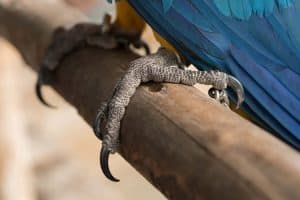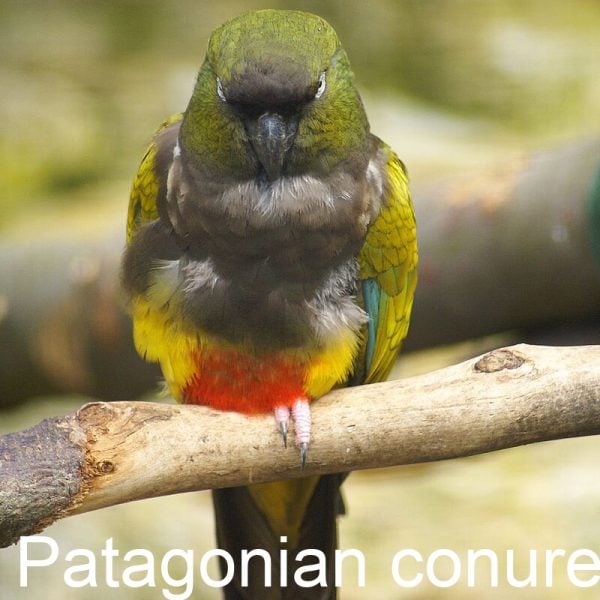Last Updated on by Mitch Rezman
Janie D.
I have an almost 16-year-old Red Fronted Macaw.
(2 – Red Fronted Macaws pictured above)
I got her as a 6-month-old chick and taught her bite words “hurt” and “cry”.
She uses them accurately!
She will pinch my arm if I reach carelessly into her cage and she will say HURT!
When she preens my hair and gets rough.
I will say are you tickling me?
Then she laughs, and stops being rough and also when I tickle her!
Birds can learn emotions if taught what they mean.
If she slips off her perch she says that hurts! Cry!
My husband had a Blue and Gold Macaw a few years ago. (she passed on)
However, she chose him!
But being young I taught her” sweet beak”.
If I had to take her out of her cage I had to towel her.
But she would stick her beak through the bars of her cage and tell me sweet beak.
Which meant I was OK to kiss her or touch her beak!
My experience with birds suggests they can be taught quite a bit with time and patience!
I think knowing a bird uses its beak much like a foot can scare people!
They use it to hold on to you as well as to bite!
Janie
Well put Janie,
We know that parrots can accept and communicate concepts.
- Their brain neurons process information three times faster than mammals including humans.
- Their flicker fusion rate but some see slideshows and sets of constant motion enabling them to make better decisions while in flight.
Alex the African Grey parrot by Dr. Irene Pepperberg.
Alex the parrot is the only non-human to ask the existential question – “What color am I”
There is no good way to avoid reaching carelessly into a birdcage.
There is no good way to avoid reaching eloquently into a birdcage.
Our advice is “never reach into a birdcage if you don’t expect to get bitten.”
One simple hack to this problem is by placing a perch (great for a grooming perch) just inside the cage door.
When the door opens, this allows the bird to become out and still be on the cage without being in the cage so they maintain a sense of security and you can easier get into the cage.
We recommend the grooming perch on the inside front door so while they are excitedly waiting to be let out of the cage, they do a little happy dance which enables the benign trimming of nails and beaks.
You are partially correct when you say that a parrot beak and feet operate the same way.
Both are useful for climbing and eating.
A major difference is that a parrot’s zygodactyl feet have very few nerves allowing them to land on thorny bushes as an example.
Beaks on the other hand although they apparently are made of solid keratin which contains tens of thousands of called nerve endings called corpuscles of Herbst, making the beak a very sensitive organ that should not be messed with by anyone other than a veterinarian.
MitchR
=============================
Hello Mitch and Catherine
I have a Moluccan cockatoo, an Umbrella cockatoo and a Blue and Gold Macaw.
I realize cockatoos can be loud screamers. however lately the macaw has started screaming a lot.
I am the macaw’s third owner.
I have tried to get her to play with toys.
She is not a lap or a shoulder bird she does not stay on a bird stand.
Her favorite thing is to chew on old blue jeans while sitting on my chair.
If I don’t remove everything I don’t want to be destroyed, she will go after remotes etc and even electric cords, which I make sure are out of her reach.
She is 29, smart a good talker.
She is snuggly sometimes but also nippy at times.
I can’t stand the constant screaming by one or all three of them.
I accept blame for conditioning them to be spoiled by picking them up every time they squawk.
I worry about bothering the neighbors.
What do you suggest?
Loserbarb
Sounds like she’s acting like a bird Loserbarb.
From what I gather, she doesn’t have a lot of foraging and enrichment opportunities other than old blue jeans.
I would advocate introducing anything from blocks of wood to big toys and even hanging phonebooks from the cage.
Here’s a list of very inexpensive DIY bird toys that may begin to help keep her occupied.
https://windycityparrot.com/free-diy-c-630_341/
Her screaming is a result of mimicking the other two birds in your home.
Birds will be birds and they all need “scream time”.
https://windycityparrot.com/blog/2017/04/24/parrots-scream-lot/
It’s also important to constantly reward her (and the other two) for silence.
Let’s start with that and see what happens.
Best
MitchR
==========================
Ian wrote
Jun 24, 2019
Hi, I have a blue and gold macaw about a year old now.
She has a play perch and a large cage in the lounge which is open plan with the kitchen, and a sleeper cage in her own room.
She is handicapped with the talons on both main toes bitten off, and two toes deformed due to nest cramp according to the vet.
We have bonded well and I love her dearly, but I have 2 problems.
First is food.
Whenever I am in the kitchen especially cooking she knows it’s about food and gets down and comes into the kitchen.
I put her back and she just gets down again.
Then I lock her in her big cage and she screams and tips her food bowls out.
Second is about food too.
I need to eat and can’t always eat bird-friendly food, but if I eat in front of her I have to share, and if I don’t she gets angry and bites me quite hard.
She continues to bite me for several minutes and then I get angry and put her in her sleeper cage, and I feel bad about it.
What can I do?
Please help!
Ian
Let’s start at the end and work backward Ian.
Getting bit by a bird is never ever acceptable.
The fact that she continues to bite you for several minutes indicates to her that it is okay to bite you further exasperating the problem.
We’re not asking you to eat bird-friendly food she just wants to dine with you because you are her flock.
A parrots day mainly consists of three things, eating, preening and sleeping.
Just because you’re not ready to eat does not mean she isn’t ready to eat.
That’s been instinctually instilled into her for literally over 100 million years.
She’s being a bird, she is not being bad and deserves no punishment, which usually doesn’t work anyway.
It would be quite easy to put a peanut in the shell, a walnut, almond and cashew on the plate you are eating from.
As she approaches to share your food make a big deal out of the nuts and noisily drop just one into a shallow food dish across from you.
This helps separate her beak from your skin.
When she comes in the kitchen as you are cooking which is overall a bad idea because of the sharp instruments, open flames, and boiling liquids thing, have a place where she can sit away from it all and still be a part of the family, like her own play stand.
Offer her a small dish of high-value treats similar to the aforementioned nuts.
In the wild parrots spend 40% of their time searching for food and 60% of their time trying not to be food.
She just wants to be with you Ian, you are all she has – let her – it’s OK to compromise.
Hope that helps.
Best
MitchR
Anne started the conversation
Hi Mitch, I am the wife of Bing who wrote to you about our female yellow color macaw laying eggs. I have a question about your response. We did take the egg away from her the first year but that resulted in her laying another until she had two. I don’t want her to continue producing eggs which is why we let her sit with just the two she has. If we remove the eggs, won’t that make her want to lay more?
She only does this once a year So I would not consider her to be a chronic egg layer.
Anne
No, you’re right – as I said it’s not a big problem.
If it’s working, carry on.
I would advocate a well-bird check-up with a full blood panel to ensure there are no deficiencies.
Best
MitchR
I have a Hahn’s Macaw which I have been feeding the eclectus blend with some fresh vegetables and walnuts.
Having taken the Bird Test, I now know I really should be feeding him pellets. So which one would be good? He loves sunflower seeds, millet, walnuts, figs. Thoughts?
Thanks, Jennifer
PS, even though I got a score of 52%, I was thrilled to find out what I don’t know, so no apologies! Thank you!
Hi Jennifer,
We are thrilled the test worked out for you. There is no reason not to feed your bird pellets.
Just keep in mind they are not the cure-all and all for bird food.
Some birds embrace them others do not.
The benefit to any commercial bird food is knowing the content of protein fat and fiber.
The problem with feeding human food is knowing how much protein as well as vitamins and enzymes your bird is getting.
This is important because the 8000 or so feathers on your Hahns come from amino acids which are derived from protein.
Your bird may lose those feathers via molt once or even twice a year.
If you have a female that goes into any hormonal or brooding mode the need for calories increases as well.
A fine Bird Food mix is Tropimix from Hagen. It has hull-less seeds, fruits, nuts, and Tropican pellets and is a veterinary recommended blend.
Hope that helps
======================
Gloria wrote
May 24, 2019
My 19-year-old male Senegal has been biting me, especially if he’s not getting enough attention or when he’s on my shoulder and I’m not going in the direction he wants to go. Also, he’s very hormonal. Always rubbing his butt on my arm or shoulder.
Catherine Tobsing replied
May 24, 2019
Your Senegal is likely hormonal and is lashing out.
We all hear about hormonal female birds, but males can also suffer hormonally.
Tropical birds in our hemisphere suffer under our poor quality lighting. And the constant cloudy skies don’t help either.
A full spectrum bulb placed as close as possible to the top of his cage set on a timer 12 hours on and 12 hours off should help.
The even lighting will help his hormones to stop raging.
Read up on this in our many blog posts on the topic of LIGHTING
Are you petting him from the neck down? If so, stop it.
Pet him only from the neck up. Petting lower only contributes to incorrect feelings and aggression.
Does he have a bed or a hut for sleeping? It has to go.
His toys should not be such that he can have them laying on him, encompassing him.
They should line the inside of his cage bars so he can go to them as desired.
Shoulder riding is not a right, but an earned privilege.
Until he gets through his hormonal flux use a perch or your hand if he won’t bite to move him.
If he is flighted he can fly from place to place and not need you to carry him.
Does he have a favorite toy? If so, that can help to lure him from place to place.
Get his playtime in and out of the cage on a schedule, including his time with you.
Birds can tell time and they can learn to anticipate activities and playtime, so he is more likely to calm down as he knows his time with you is coming soon.
Please try these things. With the correct lighting, you should see improvements in his behavior in less than 30 days.
Please let me know how it goes.
Catherine
Author Profile
Latest entries
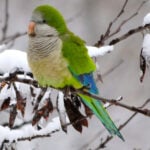 The Traveling BirdJune 26, 2025Can You Name 5 Parrot Species That Are Living Wild in the USA?
The Traveling BirdJune 26, 2025Can You Name 5 Parrot Species That Are Living Wild in the USA?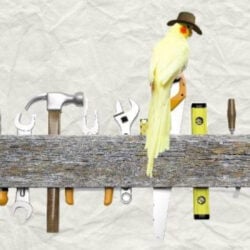 Bird BehaviorJune 26, 2025How is it Parrots Are Problem Solvers Social Animals and Even Use Tools?
Bird BehaviorJune 26, 2025How is it Parrots Are Problem Solvers Social Animals and Even Use Tools?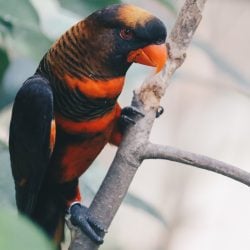 Bird & Parrot AnatomyJune 25, 2025How a Tiny Chemical Modification Makes Parrots Nature’s Living Paintings
Bird & Parrot AnatomyJune 25, 2025How a Tiny Chemical Modification Makes Parrots Nature’s Living Paintings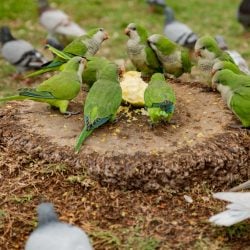 PigeonsJune 20, 2025How Do Parrots Thrive in Cities Outside Their Native Habitats?
PigeonsJune 20, 2025How Do Parrots Thrive in Cities Outside Their Native Habitats?


